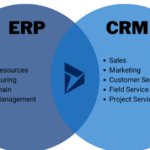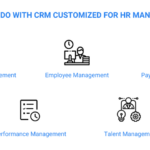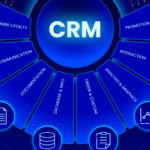Though the industry is rather new, almost everyone looking to grow a business hears about and compares CRM systems. If you’re wondering if a CRM system is what your company needs to earn more revenue, this blog offers definitions and tips for evaluating what your company really needs to cultivate success.
CRM stands for customer relationship management
The meaning of which sounds like one particular aspect of your business; If you have a great CRM system, you’re optimizing your efficiencies in ALL aspects of your business.
You’ve heard of working in customer service and it’s often thought of as a separate job within numerous companies. Someone does the work, handling the questions, concerns, and transactions with clientele purchasing goods or services.
Smart business owners know happy, loyal customers, means longevity. It requires a lot of resources to constantly bring in new customers whereas maintaining a returning group of clients translates to consistent income and word-of-mouth (otherwise knowns as free) advertising. The application of the right CRM system improves your customer relationships by making sure the business is set up to serve the community at the highest operating capacity.
For example, having the most popular products in stock at all times will reduce the number of times you have to tell a customer you don’t have what they want. A well-made CRM system may include an inventory tracking option to show what products are most often purchased and which are simply taking up space on the shelf. This is a material aspect of your business and, still, it touches your ability to keep customers satisfied.
Which of the three types of CRM systems would best fit your business?
The three different types of CRM systems are known as Analytical, Operational, and Collaborative. The product or focus of your business may make one of these three types the most obvious choices or you may find you need a CRM system which can perform on more than one level.
Analytical CRM systems basically learn about a customer through sales activity to predict what the customer will want to buy in the future. For example, if a customer makes a purchase for air conditioning check-ups, the information will work through the CRM system to send promotions for filters or other cleaning necessities for the AC unit.
Operational CRM systems focus on automating sales and marketing activities. Let’s say a customer writes to the company asking about a rate for a particular service. A message can be designed to auto-deliver to the customer advertising a deal for a lower rate. Getting to know what customers need and for what they are willing to pay refines this system of offering customers incentive to stay with your company rather than switch to a competitor.
Finally, a Collaborative CRM system, sometimes referred to as a Strategic CRM system, interconnects information across all departments of a company. For example, if you are a plumber and you receive a complaint from a customer about a part or service, this data is shared with each department in order to zero in on the problem and resolve it efficiently and to the customer’s satisfaction. Maybe human resources will see a particular plumber tends to perform poorly on certain service jobs or someone will notice a specific part is failing and Logistics will see a replacement part is required.
Top 5 things to look for when trying out a new CRM system
With the various types of CRM systems in mind, here are 5 qualities in need of a test drive before you buy any CRM application.
#1: Finding the right CRM system will mean there is an obvious ease of use for your team.
If the CRM system is difficult to use, it defeats the purpose of choosing to implement it into your company. According to Syed Balkhi of OptinMonster, “When deciding on a new CRM system, my initial thought is to analyze the user experience. I know that if the design is intuitive and easy to use, my employees will be able to find information quicker, which could result in them reaching out to more clients.”
#2: Another critical item for consideration when choosing the best CRM system for your business is whether or not customizable templates are available.
Not all businesses run the same way even if they are in the same industry. Each team is unique with a unique set of necessities to function at the highest level. Customization is important to have the capability of adjusting your CRM system to work seamlessly with your organization’s best practices.
#3: A CRM system must have sophisticated reporting features based on the metrics most important to your business.
If your business is service-based only, you want to make sure the reporting features tell you what you need to know about your customers’ needs. What you will want to see reported are hours it takes service providers to complete tasks, a record of communication with the customer to avoid double troubleshooting for tough service calls, etc. Whatever you need to know to keep your business running smoothly, the reporting features must marry up and be easy to scan and understand.
#4: Expert CRM systems offer ways to integrate into day-to-day operations.
If you’re tracking hours, the CRM system should have a clear scheduler and alert system to keep essential personnel in the know even while on-the-go. Check to see if the CRM system has a mobile app to maintain visibility on what is happening during the day no matter where you are. Is there a GPS tracker so you can see when company vehicles leave and return for the day? Check to see what features would be the most useful to streamlining your everyday tasks.
#5: Before you choose a CRM system, be sure to gather feedback from all staff after a free trial.
A CRM system which can stand behind its product will offer some kind of free trial. Have your team give it a try for a period of time and learn from your employees’ feedback as to what did and did not work before you buy anything.
Try CRM Runner software for free over the next 30 days to see how this CRM system will increase efficiencies, save money and grow company revenue.
CRM Runner is ideal for service and product-based businesses relying on employees in the field. See how this collaborative CRM system will offer a strategic approach to daily operations in order to give managers the time they require to interface with customers. Check out the features and start a free trial by signing up here.






0 Comments